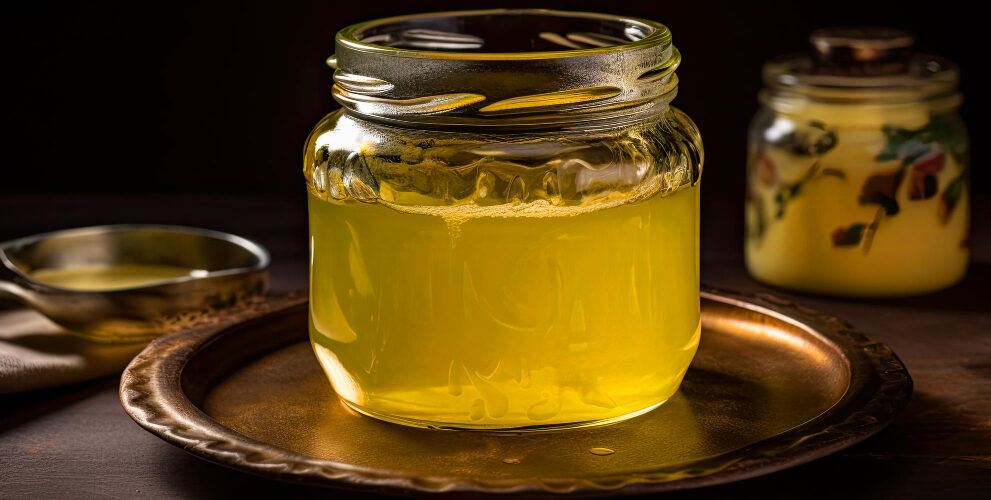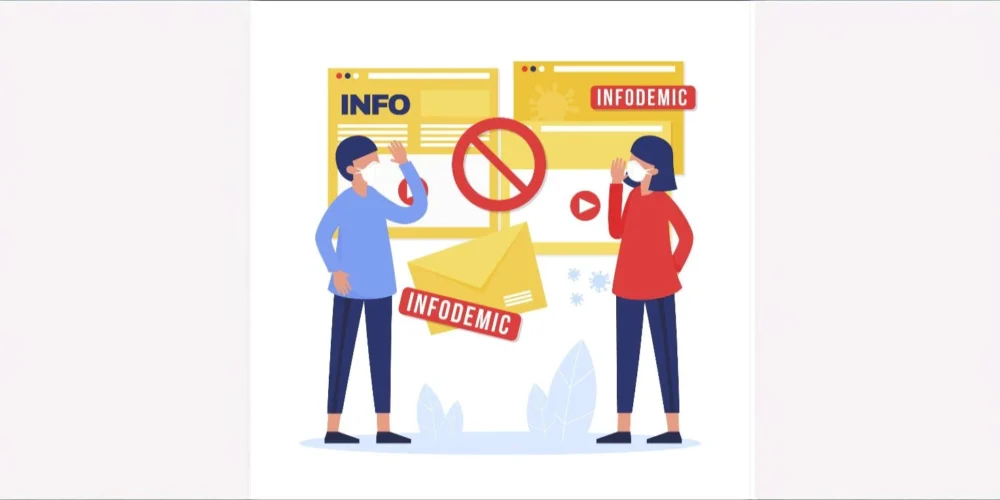Fact check: Can rubbing ghee and coconut oil on the navel really improve vision?
Experts confirm there is no scientific evidence to support this traditional belief. Instead, effective eye health depends on a balanced diet, regular check-ups, and timely medical care
Author
Author
- admin / 3 months

- 0
- 5 min read

Author
CLAIM:
Applying a mixture of desi ghee and coconut oil on the navel and under the arms can strengthen eyesight and activate the brain’s medulla oblongata
FACT:
False. There is no scientific evidence that applying ghee or coconut oil to the navel improves eyesight or activates the medulla oblongata. Experts suggest that maintaining eye health depends on a balanced diet, regular eye check-ups, and timely medical care.
In a viral Instagram reel that has garnered over 5.8 million views, Subhash Goyal is claiming a unique Ayurvedic method to enhance eyesight. In the reel, Goyal explains a trending practice that involves using desi ghee (clarified butter) and coconut oil on the navel to improve vision.
“One teaspoon of ghee (clarified butter) and ½ teaspoon of coconut oil. Mix it well and rub it on your navel and your child’s navel, and under the arms before taking a bath and before going to bed. This will strengthen your eyes and activate the medulla of the brain,” he suggests.
According to the Vaidban website, Subhash Goyal is the Managing Director of Vaidban Ayurved Bhawan, has been a trusted figure in Ayurveda for nearly three decades.
“Since founding Vaidban in 1992, he has remained committed to promoting the healing power of Ayurveda, successfully treating countless patients with chronic conditions like addictions, skin diseases, and mental disorders. His dedication to holistic health and compassionate approach has earned him immense respect and trust within the community,” according to their website.

Considering the reel’s massive reach, First Check decided to investigate the truth behind these claims and examine whether this practice has any scientific basis for improving vision.
Does applying ghee and coconut oil on the navel boost eyesight?
Navel therapy, often referred to as “nabhi chikitsa,” has its roots in Ayurvedic principles and is widely promoted in traditional wellness practices. In Ayurveda, the navel is considered an important energy centre that connects various physiological systems through channels called strotas.
Navel oiling is believed to help balance the tridoshas and support overall health. However, while these claims are popular in anecdotal and traditional circles, there is no credible scientific evidence that applying ghee or coconut oil to the navel can improve eyesight or treat any specific health condition.
The practice remains largely unsupported by rigorous clinical research.
The medulla oblongata myth
The viral post also suggests that oiling the navel and underarms can stimulate the medulla oblongata and improve vision. This is not physiologically accurate.
The medulla oblongata, located at the base of the brainstem, is responsible for regulating essential autonomic functions such as heart rate, respiration, and blood pressure. The skin on the navel and underarms does not share direct neuronal or circulatory pathways with the medulla, and therefore, topical application of oils in these areas cannot influence its activity.
Furthermore, visual processing occurs primarily in the occipital lobe, involving the retina, optic nerves, and visual cortex, with no involvement of the medulla. There is thus no neuroanatomical or physiological basis for the claim that oiling these areas can enhance eyesight.
Ways to improve eyesight
Commenting on the reel, Dr Uma Mallaiah, Ophthalmologist at Indraprastha Apollo Hospitals, New Delhi, with over 28 years of experience, said there is no scientific basis for the claim. “No, I do not know of any scientific basis for this. There’s also no proof that applying oil to the navel or underarms can activate the medulla of the brain,” she clarified.
Dr Mallaiah emphasised that maintaining a good and healthy diet is essential for eye health. She explained that while vitamin A deficiency was once a significant cause of vision loss, especially among malnourished populations, such cases are now extremely rare in urban areas.
“Earlier, we used to see children lose vision due to vitamin A deficiency. Thankfully, that’s something we hardly see anymore. But nutrition continues to play a vital role in maintaining healthy eyesight,” she said.
Highlighting the importance of early eye check-ups, Dr Mallaiah advised parents to get their children’s eyes tested at least once before they start school. “Children around the age of three or four should have their eyes examined once. They can’t always communicate if they have a problem, and early detection can prevent long-term issues,” she noted.
She also stressed the importance of regular eye examinations in adults, particularly after the age of 40. “After 40, regular eye check-ups are very important because conditions like glaucoma can cause blindness without showing any symptoms. Early diagnosis can prevent permanent vision loss,” she warned.
Dr Mallaiah added that individuals with underlying health conditions such as diabetes, hypertension, or kidney disease should be especially vigilant. “Diabetes, in particular, can severely damage the eyes and even lead to blindness. Routine eye checks are essential in such cases,” she said, adding that patients must follow medical advice closely.
“If your ophthalmologist has prescribed spectacles or eye drops, use them regularly. Neglecting treatment can worsen your condition,” she concluded.
Also read: FACT CHECK: Is coconut oil silently damaging your scalp?










